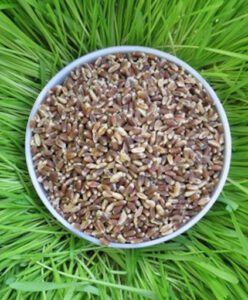
Exports of Ukrainian organic products to the countries of the European Union in 2020 decreased by 23.1% compared to 2019, to 217,210 tonnes. According to the June report of the European Commission, last year Ukraine ranked fourth in the world among suppliers of organic products to this market, its total share of supplies amounted to 7.8%.
Organic cereals (excluding wheat and rice cereals) became the main Ukrainian export crop to the EU organic market, their exports in 2020 sank by 44%, to 82,900 tonnes. Despite the decline, Ukraine remained the main supplier to the European Union, its share amounted to 74.4% of the total supply.
Exports of organic soybeans from Ukraine to the EU in 2020 increased by 67.8% compared to 2019, to 28.7% (21% of the world exports to Europe), organic oilseeds decreased by one third, to 19,300 tonnes (14.1%), oilseed meal – by 9.4%, to 7,400 tonnes (3.2%).
In 2020, Ukraine also exported 5.9% more fresh and dried organic vegetables to the EU than in 2019, 15,500 tonnes, while the export of fresh, chilled and dried organic vegetables decreased by 13.2%, to 5,400 tonnes.
As reported, the Ministry of Economy in April 2021 planned to allocate UAH 50 million for the development of organic production, the amount of state support may increase due to the redistribution of funds from other state programs.
The ministry intends to provide financial support to organic producers in the amount of UAH 5,000 per hectare of cultivated land (but not more than 20 hectares per farm), as well as for one animal (cattle). In addition, farmers will receive refunds of up to 30% of the cost of certification of organic production.

Ukraine since the beginning of the 2020/2021 marketing year (July-June) and as of June 9, 2021 had exported 42.61 million tonnes of grain and leguminous crops, which is 22.4% less than on the same date of the previous MY.
According to the information and analytical portal of the agro-industrial complex of Ukraine, to date, 16.04 million tonnes of wheat, 21.77 million tonnes of corn, and 4.15 million tonnes of barley have been exported.
As of the indicated date, 113,800 tonnes of flour were also exported.
According to the Ministry of Agrarian Policy, Ukraine exported 56.72 million tonnes of grain and legumes in the 2019/2020 MY.
As reported, the Ministry of Economy in February predicted a decline in exports of grains and legumes in the 2020/2021 MY by 20.5% compared to the previous MY, to 45.4 million tonnes.

Ukraine and Egypt are discussing the possibility of joint production between enterprises and export to the African market, Ambassador Extraordinary and Plenipotentiary of the Arab Republic of Egypt Ayman Ahmed Mokhtar Elgammal has said in an exclusive interview to Interfax-Ukraine.
Egypt is a member of a number of free trade areas in African and Arab countries, he said. The official added that, for example, they invited the Ukrainian government to invest in the Suez Canal Economic Zone (SCZone).
According to the ambassador, Ukrainian enterprises will be able to manufacture products in Egypt and benefit from Egyptian free trade agreements in the region.
This will also be the topic of a meeting of the intergovernmental technical committee in June, he added.
At the same time, he clarified that so far no proposals have been received from Ukrainian companies on investments in SCZone.
At the same time, various organizations in Ukraine, in particular Ukrmashbud and its member companies, have asked to open their representative offices in Egypt for the joint production of high-tech goods of heavy engineering, the ambassador said.

The Ministry of Foreign Affairs of Ukraine and the State Service for Food Safety and Consumer Protection have agreed on the form of an export veterinary certificate for the supply of small livestock to Kuwait with the relevant authority of this country, according to a posting on the website of the State Service for Food Safety and Consumer Protection.
“Ukrainian producers engaged in breeding and raising small livestock are able to compete in the global market. The opening of the Kuwait market for the export of small ruminants creates additional opportunities for them. For our part, my colleagues from the Ministry of Foreign Affairs and I will continue opening new export markets,” Head of the authority Vladyslava Mahaletska said.
The form of this certificate is posted on the website of the State Service for Food Safety and Consumer Protection.
As reported, in May, the State Service for Food Safety and Consumer Protection agreed on the form of an export veterinary certificate for the supply of milk and dairy products to Kuwait.
Over the past six months, in April, eight new markets were opened for Ukrainian exporters, 63 commodity items were repeatedly approved in 11 states and international economic organizations. Markets in Japan, Libya, Argentina and Lebanon were opened for milk and dairy producers. Domestic producers were able to supply eggs to Ethiopia, animal protein to Serbia, and cattle to the UAE. The export of arachnids (insects used to protect agricultural crops) is open to the Lithuanian market.

Kernel, one of the largest Ukrainian agrarian groups, intends to increase grain exports from Ukraine from 8.5 million to 10 million tonnes in the 2021/2022 fiscal year (July-June), Kernel CEO Andriy Verevsky said during a conference call with analysts.
“We plan to export more than 10 million tonnes of grain in the next fiscal year,” he said.
According to the company, in January-March 2021, Kernel reduced grain exports from Ukraine by 15% compared to January-March 2020, to 1.8 million tonnes.
Kernel said that in the first nine months of the current FY it has fulfilled 75% of its plan for the export of grain from Ukraine, which the company set for this year at 8.5 million tonnes.
In October 2020, the agricultural producer announced plans to increase grain exports from Ukraine in 2020/2021 FY by 20.3%, to 9.5 million tonnes, and sunflower crushing by 1.7%, to 3.5 million tonnes.
Kernel is a large producer and exporter of sunflower oil.